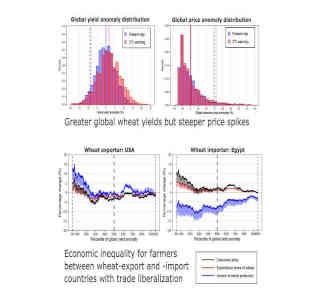Rising temperatures are harmful to wheat yields. However, crop yields do not provide a holistic vision of food security. The impacts of climate change on wheat price, livelihood and agricultural market fundamentals are also important to food security but have been largely overlooked.
An international research team has now estimated the comprehensive impact of climate change and extreme climate events on global wheat supply and the demand chain in a 2 ℃ warmer world by using a novel climate-wheat-economic ensemble modeling approach.
The findings, by scientists from six countries, were published in One Earth on August 19.
Co-author Karin van der Wiel, a climate scientist at the Royal Netherlands Meteorological Institute, further explained that "this leads to higher demand for international trade and higher consumer prices in the importing countries, which would deepen the traditional trade patterns between wheat importing and exporting countries."
The effect of CO2 fertilization could cancel out temperature stress on crops, with a slightly greater wheat yield under 2 ℃ warming as a result.

Earlier researchers pointed out that trade liberalization would help mitigate climate stress via improving market mobility. The current research team revealed that such policies could indeed reduce consumers' economic burden from wheat products. However, the impact on farmers' income would be mixed. For example, trade liberalization policy under 2 ℃ warming could stabilize or even improve farmers' income in wheat exporting countries but would reduce income for farmers in wheat importing countries.
"These results would potentially cause a larger income gap, creating a new economic inequality between wheat importing and exporting countries," said WEI Taoyuan, co-author and an economic scientist at the CICERO Center for International Climate Research. Zhang further explained more dependence on imports could lower the wheat self-sufficiency ratio, thus causing a "vicious negative cycle" for wheat importing and less-developed countries in the long term.
Click here to see more...